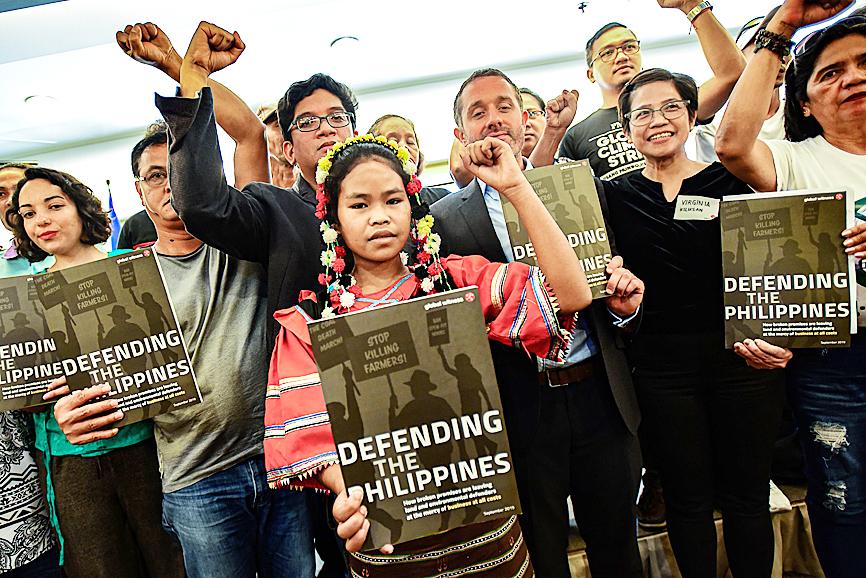At least 212 environmental campaigners worldwide were murdered last year, making it the deadliest year on record for front-line activists battling the destruction of nature, watchdog group Global Witness reported yesterday.
Colombia and the Philippines combined accounted for just over half of the confirmed deaths — 64 and 43 respectively — followed by Brazil, Mexico, Honduras and Guatemala.
The real number is likely higher due to unreported or misrepresented cases, especially in Africa, the non-governmental organization said in its annual review.

Photo: AFP
About 40 percent of victims were indigenous people, and more than two-thirds died in Latin America. One in 10 were women.
For decades, native communities in the forests of Central and South America, Asia and Africa have seen ancestral lands degraded and destroyed, sometimes with the blessing of corrupt local or national governments.
Of the 141 murders last year that could be linked a specific economic sectors, more than one-third involved campaigners protesting mining operations, some legal most not.
Thirty-four killings related to agribusiness were overwhelmingly in Asia, especially the Philippines.
Two Indonesian activists were stabbed to death in October near a palm oil plantation in Sumatra.
In the Philippines, police and counterinsurgency operations led to the massacre of 14 sugar plantation farmers on Negros island in March, only months after nine others had been killed in similar circumstances.
“Agribusiness and oil, gas and mining have consistently been the biggest drivers of attacks against land and environmental defenders,” Global Witness campaigner Rachel Cox said.
“They are also the industries pushing us further into runaway climate change through deforestation and increased carbon emissions,” she said.
Logging operations were directly linked to 24 deaths, with another 14 related to illegal crop substitution, 11 to land reform, and six to water management or dam construction.
In the Philippines, a Manobo tribal chieftain was killed during a military bombardment while protesting rogue mining operations near Kitaotao on Mindanao.
“The Philippines’ remaining virgin forests — like those protected by the Manobo — are being felled for mineral extraction and profit,” the report said.
“This is ‘business as usual’ for [Philippine] President Rodrigo Duterte and his government who are forging ahead with policies that prioritize fossil fuels and have passed draconian laws that can be used to silence those trying to stand in their way,” it said.
The number of killings in Colombia more than doubled last year, while in Honduras they rose from four to 14.
The tropics and developing countries are not the only hot spots for violent attacks against those protecting natural resources.
In Romania, an EU member state, a forest ranger working in one of Europe’s largest primeval forests was shot dead for trying to protect trees against organized criminal gangs harvesting them for profit.
A month earlier, one of her colleagues was murdered with an axe to the back of the head.
“At a time when we most need people to protect the planet against destructive, carbon-intensive industries, we are seeing the highest number of killings of land and environmental defenders” since Global Witness started tracking the issue in 2012, the report concluded.

The collapse of the Swiss Birch glacier serves as a chilling warning of the escalating dangers faced by communities worldwide living under the shadow of fragile ice, particularly in Asia, experts said. Footage of the collapse on Wednesday showed a huge cloud of ice and rubble hurtling down the mountainside into the hamlet of Blatten. Swiss Development Cooperation disaster risk reduction adviser Ali Neumann said that while the role of climate change in the case of Blatten “still needs to be investigated,” the wider impacts were clear on the cryosphere — the part of the world covered by frozen water. “Climate change and

Packed crowds in India celebrating their cricket team’s victory ended in a deadly stampede on Wednesday, with 11 mainly young fans crushed to death, the local state’s chief minister said. Joyous cricket fans had come out to celebrate and welcome home their heroes, Royal Challengers Bengaluru, after they beat Punjab Kings in a roller-coaster Indian Premier League (IPL) cricket final on Tuesday night. However, the euphoria of the vast crowds in the southern tech city of Bengaluru ended in disaster, with Indian Prime Minister Narendra calling it “absolutely heartrending.” Karnataka Chief Minister Siddaramaiah said most of the deceased are young, with 11 dead

Poland is set to hold a presidential runoff election today between two candidates offering starkly different visions for the country’s future. The winner would succeed Polish President Andrzej Duda, a conservative who is finishing his second and final term. The outcome would determine whether Poland embraces a nationalist populist trajectory or pivots more fully toward liberal, pro-European policies. An exit poll by Ipsos would be released when polls close today at 9pm local time, with a margin of error of plus or minus 2 percentage points. Final results are expected tomorrow. Whoever wins can be expected to either help or hinder the

DENIAL: Musk said that the ‘New York Times was lying their ass off,’ after it reported he used so much drugs that he developed bladder problems Elon Musk on Saturday denied a report that he used ketamine and other drugs extensively last year on the US presidential campaign trail. The New York Times on Friday reported that the billionaire adviser to US President Donald Trump used so much ketamine, a powerful anesthetic, that he developed bladder problems. The newspaper said the world’s richest person also took ecstasy and mushrooms, and traveled with a pill box last year, adding that it was not known whether Musk also took drugs while heading the so-called US Department of Government Efficiency (DOGE) after Trump took power in January. In a